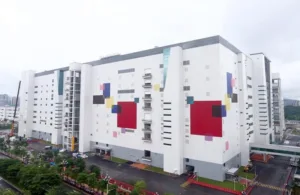LG Display announced the opening of its 8.5th generation (2,200mm x 2,500mm) OLED panel production plant in Guangzhou, China, ushering in an era of producing 10 million large-size OLED panels a year. LG Display’s new Guangzhou OLED panel plant started mass-production from this month and will mainly manufacture large-size high-resolution OLED products including 55-inch, 65-inch and 77-inch panels. The initial monthly capacity will be 60,000 sheets, which will be further expanded to 90,000 sheets by 2021.
The company expects to produce over 10 million OLED panels a year by 2022 when this monthly capacity of 90,000 sheets is combined with the 70,000 sheets currently manufactured at its OLED panel plant in Paju, Korea, as well as an additional 45,000 sheets to be produced at its 10.5thgeneration (2,940mm x 3,370mm) plant in Paju from 2022.
The new 8.5th generation OLED panel plant is operated by LG Display High-Tech China (LG Display High-Tech China Co., Ltd, LGDCO), a joint venture established between LG Display and Guangzhou Development District (GDD). LG Display holds a 70 percent stake with KRW 2.6 trillion in capital.
“Based on our vast experience and capability in OLED production, LG Display will make every effort to ensure the success of LG Display High-Tech China,” said Dr. Sang Beom Han, CEO and Vice Chairman of LG Display, at the opening ceremony attended by Korean and Chinese officials, top executives from LG group, and representatives from customer and partner companies. He added, “With our dual OLED panel production sites in Korea and China, the company will further accelerate the OLED trend in the global premium TV market by providing large-size OLED panels to the world.”
The new 8.5th generation OLED panel plant is built on 74,000 m² of land — the equivalent of around 10 football fields. With nine levels above ground, the total floor area amounts to 427,000 m². The total area of the LG Display Guangzhou Cluster, which includes LCD panel and module plants, partner company complexes and additional facilities, amounts to 1.3 million m².
As many companies are not able to mass-produce large-size OLED panels due to technical limitations, LG Display, the pioneer and only manufacturer of large-size OLED panels in the world, plans to further widen the gap with its competitors and strengthen its leading position starting from the operation of its Guangzhou OLED plant. Given that LG Display’s customers, including LG Electronics, Sony, Philips, Hisense, Skyworth, Changhong, and Konka, operate TV production plants in China, the company will further boost its competitiveness by providing technology and products in a timely manner.
In addition, as LG Display has been running an 8.5th generation LCD panel plant in Guangzhou, excellent conditions optimized for 8.5thgeneration display production have already been established in this region in terms of infrastructure, tariffs, and labor and distribution costs.
The global sales of OLED TV in 2020 are expected to reach 5.5 million units and further increase to 7.1 million units in 2021 and 10 million units in 2022, according to global market research firm IHS Markit.
The sharp increase in OLED TV demand is driven by a growing number of global TV brands manufacturing OLED TVs. The total number of those brands is now 15 worldwide and will reach 16 in 2020 when the largest TV maker in the U.S., Vizio, joins the trend. Accordingly, LG Display’s large-size OLED panel sales are on a significant and constant rise. The company saw an increase in OLED TV panel sales to 2.9 million units in 2018 and yet another increase to 3.8 million units is anticipated in 2019. LG Display expects its large-size OLED panel business to turn to profitability on an annual basis for the first time this year due to these increasing sales.
In order to meet the rapid growth in demand for OLED panels in the premium TV market, LG Display has decided to implement a two-track OLED production strategy by manufacturing large-size OLED panels in both Korea and China. LG Display’s large-size OLED panel production capacity will further increase once the 10.5th generation OLED panel production line at its P10 plant in Paju, Korea goes into operation in 2022. To this end, the company recently announced an additional investment of KRW 3 trillion into this 10.5th generation OLED production line. Through this increased production capacity, LG Display can improve productivity and profitability via economies of scale, thereby advancing the OLED era.

